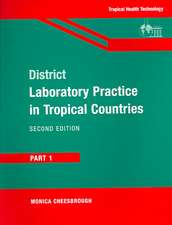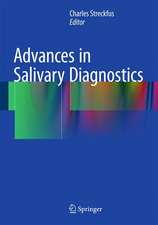What They Didn’t Teach You at Medical School
Autor Alan V. Parbhooen Limba Engleză Paperback – 3 iul 2007
This book will help the junior doctor unlock their potential and improve their performance, cutting the time it takes to achieve certain medical objectives. It is meant to fill in the gaps where the medical school and clinical guides stop. It gives the reader the information needed to organise themselves so that they can hit the ground running. It is not intended as a clinical survival guide, but more a friendly hand to allow the reader to get ahead in medicine and how to keep on track and develop a career path.
Preț: 389.67 lei
Preț vechi: 410.17 lei
-5% Nou
Puncte Express: 585
Preț estimativ în valută:
74.57€ • 77.41$ • 62.18£
74.57€ • 77.41$ • 62.18£
Carte tipărită la comandă
Livrare economică 24 martie-07 aprilie
Preluare comenzi: 021 569.72.76
Specificații
ISBN-13: 9781846284618
ISBN-10: 1846284619
Pagini: 107
Ilustrații: XI, 107 p.
Dimensiuni: 127 x 203 x 7 mm
Greutate: 0.15 kg
Ediția:2007
Editura: SPRINGER LONDON
Colecția Springer
Locul publicării:London, United Kingdom
ISBN-10: 1846284619
Pagini: 107
Ilustrații: XI, 107 p.
Dimensiuni: 127 x 203 x 7 mm
Greutate: 0.15 kg
Ediția:2007
Editura: SPRINGER LONDON
Colecția Springer
Locul publicării:London, United Kingdom
Public țintă
Professional/practitionerDescriere
During medical training there are certain parts of day-to-day tasks that are not taught at medical school nor in the traditional reference books. There are some skills that medical students are expected to learn by ‘osmosis’ while on placement and under the guidance of junior doctors. These skills are never officially taught or examined in medical school. They are, however, a fundamental part of being a safe, good and efficient doctor. This book includes ‘golden rules’ or important points to remember and case examples, both of which are given as displayed extracts.
This book is designed to help the junior doctor unlock their potential and improve their performance, cutting the time it takes to achieve certain medical objectives. It is meant to fill in the gaps where the medical school and clinical guides stop. It gives the reader the information needed to organise themselves so that they can hit the ground running. It is not intended as a clinical survival guide, but more a friendly hand to allow the reader to get ahead in medicine and how to keep on track and develop a career path.
This book is designed to help the junior doctor unlock their potential and improve their performance, cutting the time it takes to achieve certain medical objectives. It is meant to fill in the gaps where the medical school and clinical guides stop. It gives the reader the information needed to organise themselves so that they can hit the ground running. It is not intended as a clinical survival guide, but more a friendly hand to allow the reader to get ahead in medicine and how to keep on track and develop a career path.
Cuprins
IntroductionA Brief History of the National Health ServiceModern National Health Service TrustsApplying for Pre-registration House Officer PostsSurviving the Pre-registration House Officer PostThe TeamYour Consultant: Keeping Them HappyNursesRadiologists and RadiographersTherapists and Professionals Allied to MedicineReferring and RequestingClinicsThe Operating TheatreLaboratory InvestigationsGetting Registered and Applying for Senior House Officer PostsGetting on in Your Senior House Officer PostPostgraduate Examinations: Member of the Royal College of Surgeons/Member of the Royal College of PhysiciansClinical GovernanceAuditA Break from the NormIndex
Recenzii
From the reviews:
"The book is designed to be a resource guide for what is not taught in theory classes in medical school or in clinical rotations. … The purpose is to guide medical students and then new doctors as they begin their careers in a hospital setting. … The book is written for medical students about to graduate, or newly graduated doctors who are beginning their first job or residency. The author has experienced what he has written about." (Susan C. Weltz, Doody's Review Service, August, 2007)
"The book is designed to be a resource guide for what is not taught in theory classes in medical school or in clinical rotations. … The purpose is to guide medical students and then new doctors as they begin their careers in a hospital setting. … The book is written for medical students about to graduate, or newly graduated doctors who are beginning their first job or residency. The author has experienced what he has written about." (Susan C. Weltz, Doody's Review Service, August, 2007)
Notă biografică
Dr Alan Parbhoo is a Senior Surgical House Officer at the Royal Free Hospital in London. Concerned by how little medical school prepared the average student for the blunt reality of life in a hospital environment, he has written this series of chapters to assist in moving from the medical school to the medical workplace.
Textul de pe ultima copertă
Essential information for all junior doctors.
You are close to qualifying or you have already qualified. You are prepared to take on the working world of referrals, hospital jobs and the pager. Medical school taught you clinical anatomy, but possibly not clinical diplomacy. You have learnt how to diagnose illness but not how to identify trouble on the ward, or more importantly, how to avoid it.
Written by a doctor concerned by how little medical school prepares you for the blunt reality of life in a hospital environment, What They Didn’t Teach You at Medical School is an indispensable guide to help you sidestep the pitfalls of the job and achieve the heights expected by all consultants.
Divided into concise, advice-packed chapters, readers will learn how to:
• stop your pager going off
• work well with other medical specialists
• refer patients and prevent referrals being ‘bounced back’
• keep your seniors smiling
• get on with nurses
• get a job and a career path
This book will help you in becoming an experienced doctor, impressing your peers and helping you fast-track your career. Above all, this guide will help you to hit the ground running and give you a head start in the increasingly competitive medical world.
You are close to qualifying or you have already qualified. You are prepared to take on the working world of referrals, hospital jobs and the pager. Medical school taught you clinical anatomy, but possibly not clinical diplomacy. You have learnt how to diagnose illness but not how to identify trouble on the ward, or more importantly, how to avoid it.
Written by a doctor concerned by how little medical school prepares you for the blunt reality of life in a hospital environment, What They Didn’t Teach You at Medical School is an indispensable guide to help you sidestep the pitfalls of the job and achieve the heights expected by all consultants.
Divided into concise, advice-packed chapters, readers will learn how to:
• stop your pager going off
• work well with other medical specialists
• refer patients and prevent referrals being ‘bounced back’
• keep your seniors smiling
• get on with nurses
• get a job and a career path
This book will help you in becoming an experienced doctor, impressing your peers and helping you fast-track your career. Above all, this guide will help you to hit the ground running and give you a head start in the increasingly competitive medical world.
Caracteristici
Essential information for all junior doctors
Practical, relevant and current pearls for newly qualified medical practitioners
Practical, relevant and current pearls for newly qualified medical practitioners









